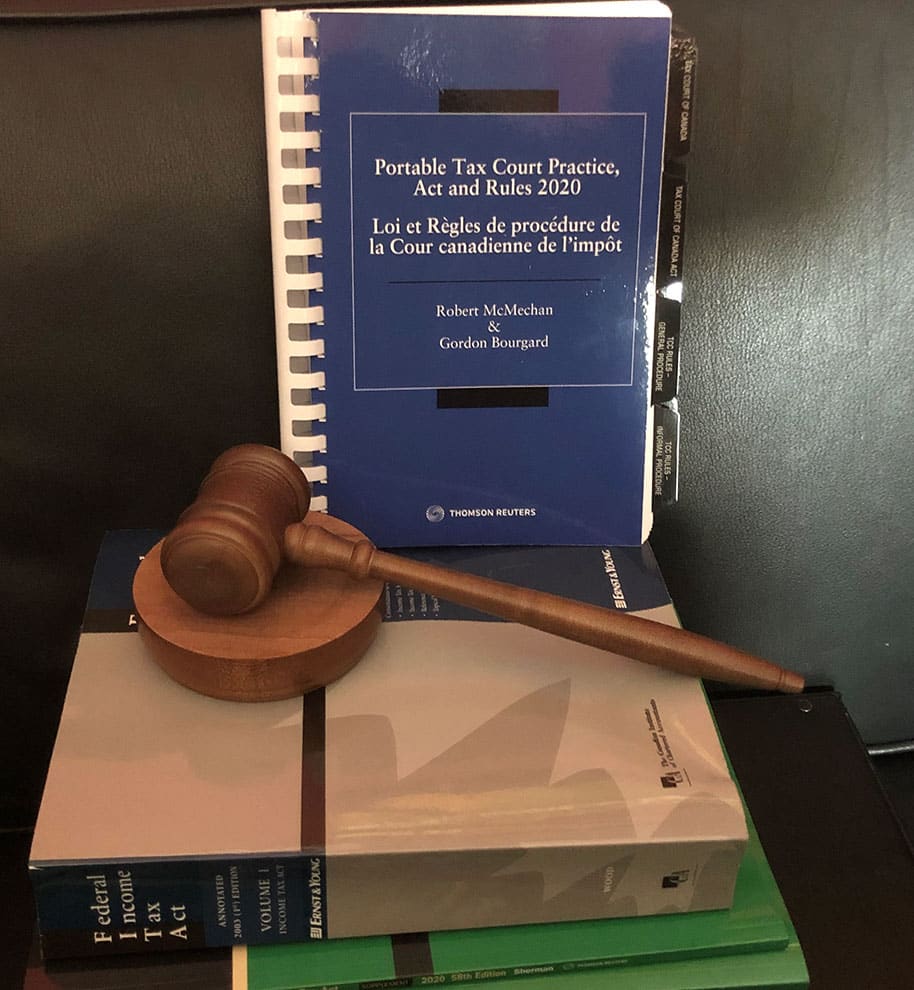Introduction: Settling Tax Litigation in Canada
Tax settlements play a vital role in tax administration and enforcement. It would be burdensome and impractical to litigate every tax dispute in Tax Court. When entering settlement discussions with the Canadian tax-litigation lawyer for the Canada Revenue Agency, taxpayers must carefully assess several critical factors. These include the types of settlements that courts will actually enforce against the CRA and the potential cost implications of accepting or rejecting a settlement offer.
This article discusses a few of the intricacies of settling Canadian tax disputes and challenges that Canadian taxpayers may face as a result of these nuances. Afterwards, it provides tax tips about tax-dispute settlements from our expert Canadian tax-litigation lawyers, and it answers some frequently asked questions.
Enforceable Tax Settlements: A “Principled Settlement”
A tax settlement must be principled in the sense that the result reflects the underlying facts and the applicable law. If the parties enter a settlement agreement that isn’t defensible on the facts or the law, that settlement agreement cannot bind the Canada Revenue Agency—even in the unlikely event that the CRA’s Canadian tax-litigation lawyer signed the agreement on the CRA’s behalf.
Canada’s Federal Court of Appeal has long maintained that the Canada Revenue Agency cannot be bound by a “compromise settlement” (e.g., see: Galway v. MNR, [1974] 1 FC 600 (CA); CIBC World Markets Inc. v. Canada, 2012 FCA 3). A “compromise settlement” refers to an agreement that relies on arbitrary compromises regarding the issues or the amount owed, and it doesn’t reflect the application of the law to the facts. Consider, for example, a tax dispute in which the central question is whether a specific supply was exempt from GST/HST. A compromise settlement would be one where the CRA agreed to, say, reduce the assessment by half. This 50/50 settlement lacks principled reasoning because the dispute turns on all-or-nothing issue: The supply is either a taxable supply, in which case the taxpayer must remit all the GST/HST, or an exempt supply, in which case the taxpayer owes no GST/HST. A court could not have rendered a decision to this effect. As a result, even if both parties entered such a compromise settlement, the settlement agreement is neither valid nor enforceable against the Canada Revenue Agency.
Indeed, the requirement of a principled settlement distinguishes tax settlements from settlements in other forms of litigation. In personal-injury litigation, for example, the parties may—and often do—enter compromise settlements, and these settlements are binding.
Cost Consequences of Settlement Offers: Rules 147(3.1) and (3.2) of the Tax Court of Canada Rules (General Procedure)
Canadian taxpayers must also consider the cost consequences relating to settlement offers. Even if the parties ultimately fail to reach a settlement agreement, a settlement offer can bring about sizeable cost implications.
Under Rules 147(3.1) and (3.2) of the Tax Court of Canada Rules (General Procedure), that party may recover substantial indemnity costs (which equal about 80% of that party’s legal fees) starting from the date that the party served a valid settlement offer. This rule applies if the party secures a judgment that’s as good as or better than the terms of the settlement offer that the other party refused to accept.
A settlement offer must meet certain conditions to trigger the cost consequences in Rules 147(3.1) and (3.2) of the Tax Court of Canada Rules (General Procedure). In McKenzie v. The Queen, 2012 TCC 329, the Tax Court of Canada clarified that to qualify for increased costs, a settlement offer must involve a “degree of compromise.” (A “degree of compromise” differs from the “compromise settlement” mentioned earlier). A “degree of compromise” means that a taxpayer cannot make a settlement offer that doesn’t concede any part of the taxpayer’s own claim. This may occur, for example, where the taxpayer essentially proposes that the other party abandon the appeal. Such an offer doesn’t display a “degree of compromise.” As a result, the taxpayer cannot cite such an offer to claim substantial indemnity costs if the court ultimately allows the taxpayer’s appeal.
Yet in Standard Life Assurance Company of Canada v. The Queen, 2015 TCC 138, the Tax Court of Canada suggested that that the principle established in McKenzie should be interpreted more narrowly and may not apply in particular cases. For example, in certain situations, an offer proposing solely that the parties bear their own costs may qualify as a proper settlement offer for the purposes of seeking substantial indemnity costs. This result seems particularly warranted when the circumstances don’t raise concerns about exploiting the Tax Court’s procedural rules. Still, this issue remains unresolved.
Pro Tax Tips – Surviving Tax Litigation & Tax Deductions for Legal Fees Relating to Tax Disputes
Without representation by an expert Canadian tax-litigation lawyer, Canadian taxpayers will encounter several challenges when attempting to formulate a tax-settlement offer, which must strike a balance between containing a degree of compromise and proposing a principled result. This is especially true in all-or-nothing cases, which are common in tax-related disputes. Tax settlements may be more feasible when the disputed reassessment involves multiple issues: the offer can concede some issues to the CRA while allowing the taxpayer to succeed on other matters. Still, the restrictions on tax settlements likely cause fewer cases to be settled than would be efficient. Perhaps the Tax Court of Canada may address this situation by reconsidering its procedural rules in light of this case law.
Fortunately, Canadian taxpayers can typically mitigate or avoid these problems through early engagement of an experienced Canadian tax-litigation lawyer. Speak to our Certified Specialist in Taxation Canadian tax lawyer today. Our savvy Canadian tax lawyers can simplify the tax-litigation process, review your evidence, get you ready for depositions, prepare your case for Tax Court, and represent you before the Tax Court of Canada during the hearing or settle your appeal before a hearing by reaching a principled, enforceable settlement agreement with the CRA’s own Canadian tax-litigation lawyer.
Moreover, Canada’s tax rules allow a taxpayer to deduct the legal fees that the taxpayer incurred for representation during a tax appeal. Subparagraph 60(o)(i) of Canada’s Income Tax Act permits a taxpayer to deduct “amounts paid by the taxpayer in the year in respect of fees or expenses incurred in preparing, instituting or prosecuting an objection to, or an appeal in relation to, an assessment of tax, interest or penalties under [the Income Tax Act] or an Act of a province that imposes a tax similar to the tax imposed under [the Income Tax Act].”
This tax rule covers the legal fees relating to (1) the preparation and filing of a notice of objection to the CRA’s Appeals Division, (2) legal representation during the objection process, (3) the preparation and filing of a notice of appeal to the Tax Court of Canada, (4) legal representation during the tax-litigation process, and (5) legal representation during post-Tax Court appeals (e.g., a tax appeal to Canada’s Federal Court of Appeal or to the Supreme Court of Canada). The deduction under subparagraph 60(o)(i) also applies to accounting expenses that a taxpayer incurred in relation to a tax objection or tax appeal.
Accordingly, if a taxpayer hires a Canadian tax-litigation lawyer to settle a tax dispute, the taxpayer’s legal fees are fully deductible for the taxation year in which the corresponding invoice was issued. For example, the taxpayer may claim payments toward the invoices that the taxpayer’s Canadian tax-litigation lawyer issued in 2023 as deductions on the taxpayer’s income-tax return for the 2023 taxation year.
FREQUENTLY ASKED QUESTIONS
I’ve heard that a tax settlement is not enforceable against the Canada Revenue Agency unless the settlement is “principled.” What does this mean?
A tax settlement must be principled in the sense that the result reflects the underlying facts and the applicable law. In other words, the settlement cannot be a “compromise settlement.” A “compromise settlement” refers to an agreement that relies on arbitrary compromises regarding the issues or the amount owed, and it doesn’t reflect the application of the law to the facts. Consider, for example, a tax dispute in which the central question is whether a specific supply was exempt from GST/HST. A compromise settlement would be one where the CRA agreed to, say, reduce the assessment by half. This 50/50 settlement lacks principled reasoning because the dispute turns on all-or-nothing issue: The supply is either a taxable supply, in which case the taxpayer must remit all the GST/HST, or an exempt supply, in which case the taxpayer owes no GST/HST. A court could not have rendered a decision to this effect.
If the parties enter a compromise settlement or a settlement agreement that isn’t defensible on the facts or the law, that agreement cannot bind the Canada Revenue Agency—even if the CRA’s Canadian tax-litigation lawyer signed the agreement on the CRA’s behalf. The settlement agreement is neither valid nor enforceable against the Canada Revenue Agency.
I recently received a notice of confirmation after my notice of objection was rejected, and I want to settle this issue without going to trial at the Tax Court of Canada. Should I hire a Canadian tax-litigation lawyer? Or is a tax settlement something that I can handle myself?
Without representation by an expert Canadian tax-litigation lawyer, you will encounter several challenges when attempting to formulate a tax-settlement offer, which must strike a balance between containing a degree of compromise and proposing a principled result. This is especially true in all-or-nothing cases, which are common in tax-related disputes. As a result, we highly recommend that you avoid representing yourself. Consult one of our savvy Canadian tax lawyers who can simplify the tax-litigation process, review your evidence, get you ready for depositions, prepare your case for Tax Court, and represent you before the Tax Court of Canada during the hearing or settle your appeal before a hearing by reaching a principled, enforceable settlement agreement with the CRA’s own Canadian tax-litigation lawyer.
DISCLAIMER: This article just provides broad information. It is only up to date as of the posting date. It has not been updated and may be out of date. It does not give legal advice and should not be relied on. Every tax scenario is unique to its circumstances and will differ from the instances described in the article. If you have specific legal questions, you should seek the advice of a Canadian tax lawyer.



